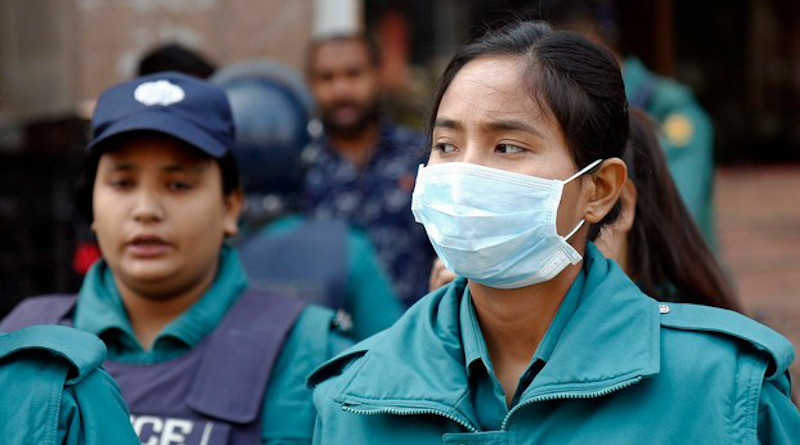Bangladesh’s Response To COVID-19 – Analysis
Bangladesh’s healthcare infrastructure has in large part developed as a result of the country’s continued exposure to disasters as well as in pursuit of MDG4 goals. As with countries across the world, the COVID-19 pandemic has had a severe medical, social, and economic impact in Bangladesh.
While Bangladesh has responded swiftly and efficiently on some counts, it also faces mounting challenges as a result of the circumstances, as well as its own institutional inadequacies.
Responses
The Bangladesh government took a number of quick initial actions. International organisations, NGOs, and civil society organisations have been key partners in the state’s response.
The Bangladesh Medical Association (BMA) was instructed to prepare a list of 500 doctors to be incorporated towards COVID-19-related infection management in the immediate aftermath of the first cases being reported. To address acute shortages in healthcare equipment and medical supplies, the Bangladesh Garment Manufacturers and Exporters Association (BGMEA) is coordinating with five member companies to produce 500,000 Personal Protective Equipment (PPE).
The Prime Minister’s Office (PMO) established direct contact with district administrations to coordinate protection measures and relief distribution work. Over April, other administrative and legal measures were put in place, including: declaring all of Bangladesh an ‘infection risk area’ under the country’s 2018 Infections Disease (Prevention, Control and Elimination) Act; assigning district-wise responsibilities for coordination; and restricting movement of people between 6 pm to 6 am.
Congregational prayers at mosques were subsequently banned. Borders were closed; land and air travel with the worst-hit countries at the time, such as China Iran, and Italy were suspended. On 30 April, India eased restrictions to open the India-Bangladesh border at Petrapole, a move that has been objected to by the West Bengal government. The opening is viewed as essential to address the shrinking supply of goods, with thousands of trucks intended for Bangladesh put on hold.
Educational institutions were closed, and 26 March to 4 April was declared a public holiday. This was subsequently extended to 14 April, and then until 25 April, and is now applicable till 16 May. The army has been deployed to manage the lockdown effectively.
Bangladesh has also encouraged all non-essential businesses to move their transactions online. It has launched a large-scale awareness campaign on its national mobile phone network operator’s platform. Some of these early steps have allowed Bangladesh an opportunity to further strengthen its healthcare facilities in light of the pandemic.
Some steps to ease economic hardships have also been taken. Bangladesh Bank has declared a moratorium on loan repayments up to end-June 2020. Relaxations in Foreign Exchange Regulations up to September 2020 were announced on 19 March. An emergency relief package of US$ 600 million, later raised to USD 8573 million to implement four programmes, has been offered. On April 12, the government announced a USD 1.7 billion relief package for the farming sector. Those whose livelihoods have been affected are being provided with meals under existing social safety programmes, rather than through direct cash transfers.
Challenges
Socio-economic assistance for the vulnerable is the immediate need of the hour. The ability to organise adequate funds and a fair disbursal of resources are some of the challenges Bangladesh will face in this regard. According to the Asian Development Bank (ADB), the country is expected to lose 1.1 per cent of its GDP growth as a result of the pandemic.
Bangladesh’s informal sector, with over 50 million workers, is the worst hit. Another six million formal sector workers, largely from the manufacturing sector, could face unemployment until June 2020. The trickle-down effects of job losses faced by Bangladeshi diaspora across Europe, West Asia, and North Africa will be felt by families in rural Bangladesh, given that remittances, which account for 5 per cent of the country’s GDP, will shrink.
The country is on the verge of a humanitarian crisis. After China, Bangladesh is the world’s second largest garment manufacturer. Its readymade garment industry, driven by a largely female workforce, is the engine of its economy. Companies across the globe have cancelled more than US$ 2 billion worth of orders. Bangladesh has already lost US$ 1.2 billion, which impacts 1.2 million workers.
While the government has introduced a US$ 558 million stimulus package for companies to pay their staff, there is no way of guaranteeing that its benefits will reach the workers. It has also been suggested that this amount is not sufficient.
On 26 April, in the midst of this brewing humanitarian crisis, many companies opened in defiance of the lockdown, with mounting pressure from global brands to meet pending order deadlines. This has impacted the legitimacy of lockdown orders, and put the already vulnerable even more at risk of exposure to COVID-19.
Bangladesh also houses nearly one million stateless Rohingya refugees in Cox’s Bazar. Reportedly, the facilities are overcrowded, flimsily built, with poor standards of health, hygiene and sanitation, and limited access to potable water. The risks these pose during a pandemic are well-recorded, and Medicine Sans Frontiers (MSF) is working to address some of the challenges.
Further, Human Rights Watch has castigated Bangladesh for supressing freedom of speech, with many doctors, opposition activists, writers, cartoonists and students reportedly arrested under the auspices of the Digital Security Act for their criticism of how the government is dealing with the pandemic.
Conclusion
Overall, the Bangladesh government has undertaken a proactive strategy in response to COVID-19, with a focus on strengthening healthcare infrastructure and delivery. The pressing economic, social, and humanitarian challenges the country faces, which have not received the same attention, are likely to intensify, and pose long-term problems.

